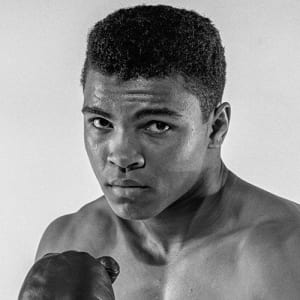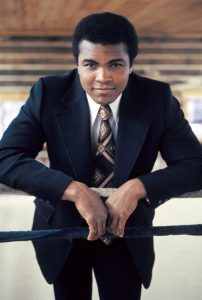

Muhammad Ali once said his “greatness came and started in Louisville.”
Now his name will be among the first things visitors and travelers see when they fly into his beloved hometown.
City officials announced Wednesday that Louisville International Airport will be renamed after the boxer and humanitarian often called “the Greatest.”
The new name: Louisville Muhammad Ali International Airport.
“Muhammad Ali belonged to the world, but he only had one hometown, and fortunately, that is our great city of Louisville,” Mayor Greg Fischer said. “Muhammad became one of the most well-known people to ever walk the Earth and has left a legacy of humanitarianism and athleticism that has inspired billions of people.
“It is important that we, as a city, further champion The Champ’s legacy,” Fischer continued. “And the airport renaming is a wonderful next step.”
The Louisville Regional Airport Authority board approved Fischer’s motion that the airport be renamed. But the SDF code will not change, officials said.
An airport authority working group began meeting in November 2017 to consider renaming the airport after Ali, who would have turned 77 years old Thursday.
“We felt a clear takeaway was that the profile of our city could be greatly enhanced by associating Ali’s name with our airport,” Boden said, adding that officials hope the name change will eventually result in increased traffic at the airport “as the city increases the promotion of tourism related to Muhammad Ali.”
Dan Mann, executive director of the Louisville Regional Airport Authority, said the airport must notify the Federal Aviation Administration of the name change. FAA approval should come fairly quickly, Mann said, as the SDF code will not change.
“I think we are 99 percent there with that agreement, so that would really be the second step which we think we can execute in the next week or two,” Mann said.
The agreement with Ali’s representatives will be in perpetuity and have no associated fees, Mann said.
Finally, officials will spend $100,000 to change the airport’s marketing and branding elements over the next two to three months to reflect Ali’s presence and align with city tourism efforts, Mann said.
Costs with incorporating Ali’s name and brand will also be rolled into the $100 million project to upgrade the airport’s terminal, jetways, rental car area, elevators and moving walkways over the next three to five years, Mann said. A new international port of entry at Louisville’s airport is also in the works.
Officials hope all of the marketing changes will be set in time for the “I Am Ali” Festival in June, which marks the anniversary of Ali’s death in 2016.
No statues of Ali will be added at the airport in order to respect Ali’s Muslim faith background, Fischer said.
Lonnie Ali, Muhammad Ali’s widow, said she’s proud the city is changing the name “to reflect Muhammad’s impact on the city and his love for his hometown.”
“I am happy that visitors from far and wide who travel to Louisville will have another touch point to Muhammad and be reminded of his open and inclusive nature, which is reflective of our city,” she said in a news release. “Muhammad was a global citizen, but he never forgot the city that gave him his start. It is a fitting testament to his legacy.”
Ali died at the age of 74 on June 3, 2016, in Scottsdale, Arizona, from septic shock. Days later, Louisville held what is regarded as the “most widely covered Muslim funeral ever held in the U.S.” Thousands of Ali’s admirers, including celebrities, international leaders and politicians, packed the Kentucky Exposition Center on June 9 for his memorial service.
Ali was born Cassius Marcellus Clay Jr. on Jan. 17, 1942. He grew up in western Louisville in a one-story, wood-frame house at 3302 Grand Ave., where he lived from the time he was a toddler.
Greg Fischer speaks about renaming the Louisville Inter Billy Kobin, Louisville Courier Journal
Several years ago, an airport terminal was renamed for longtime Mayor Jerry Abramson. The airport was formerly known as Standiford Field (SDF).
In 2016, a petition calling for the airport to be named after Ali was submitted to Fischer and the airport board. Louisville resident Robert Holmes III, who authored the petition, said it eventually garnered over 14,000 signatures.
The petitioners noted that “Ali inspired people all over the world to come together and shed our differences. This is an opportunity to unite in Ali’s life mission. We humbly invite you to join our effort to rename our airport to Muhammad Ali International.”
In a 2017 op-ed in the Courier Journal, Louisville Urban League president and CEO Sadiqa Reynolds also called for changing the airport’s name to honor “the first son of Louisville.”
“Who better to honor with the renaming of our airport? He is a symbol of what our city is aspiring to be,” Reynolds wrote. “We strive to be a city where race doesn’t matter, religion doesn’t matter and who you love is not a barrier.”
Donald Lassere, president and CEO of the Muhammad Ali Center in downtown Louisville, said the center is proud of the regional airport authority’s “forward-thinking decision regarding the airport’s name change.”
“We are confident that with this announcement, Louisville will continue to be seen around the world as a bold, compassionate city, and prompt an increase in visitors to all our great attractions.”
Fischer said it is the city’s “obligation and opportunity to showcase the many stories and complexities that made up the man known as ‘The Greatest of All Time.’ “
“Certainly, Muhammad faced discrimination and the impact of inequality, and he wasn’t shy about sharing his views on those challenges,” Fischer said. “There’s just nobody else in recorded history other than folks that we deify that’s had this type of impact on so many people.”
Reach Billy Kobin at bkobin@courierjournal.com

Be the first to comment